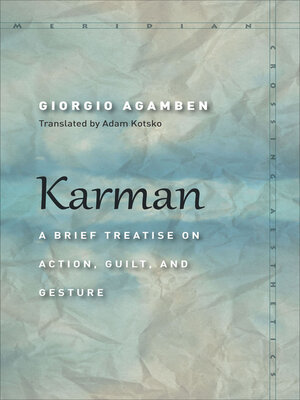Karman
ebook ∣ A Brief Treatise on Action, Guilt, and Gesture · Meridian: Crossing Aesthetics
By Giorgio Agamben

Sign up to save your library
With an OverDrive account, you can save your favorite libraries for at-a-glance information about availability. Find out more about OverDrive accounts.
Find this title in Libby, the library reading app by OverDrive.



Search for a digital library with this title
Title found at these libraries:
| Library Name | Distance |
|---|---|
| Loading... |
The renowned Italian philosopher offers a penetrating analysis of judgment, guilt, free will, and society in this brief yet profoundly original treatise.
What does it mean to be responsible for our actions? In this brief and elegant study, Giorgio Agamben traces our most profound moral intuitions back to their roots in the sphere of law and punishment. Moral accountability, human free agency, and even the very concept of cause and effect all find their origin in the language of the trial, which Western philosophy and theology both transform into the paradigm for all of human life.
In his search for a way out of this destructive paradigm, Agamben not only draws on minority opinions within the Western tradition but engages at length with Buddhist texts and concepts for the first time. In sum, Karman deepens and rearticulates some of Agamben's core insights while breaking significant new ground.
What does it mean to be responsible for our actions? In this brief and elegant study, Giorgio Agamben traces our most profound moral intuitions back to their roots in the sphere of law and punishment. Moral accountability, human free agency, and even the very concept of cause and effect all find their origin in the language of the trial, which Western philosophy and theology both transform into the paradigm for all of human life.
In his search for a way out of this destructive paradigm, Agamben not only draws on minority opinions within the Western tradition but engages at length with Buddhist texts and concepts for the first time. In sum, Karman deepens and rearticulates some of Agamben's core insights while breaking significant new ground.







